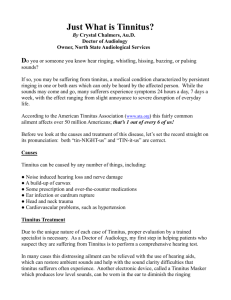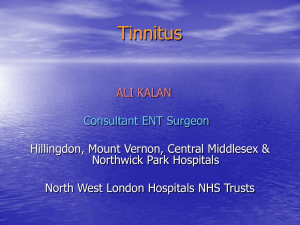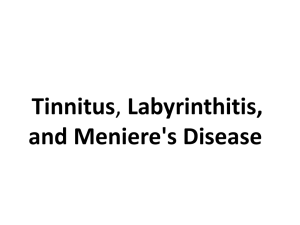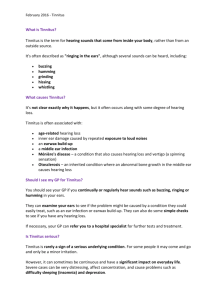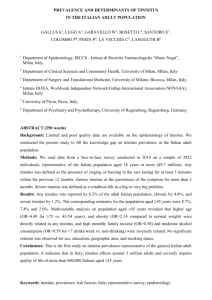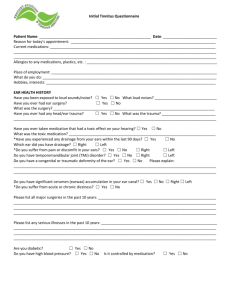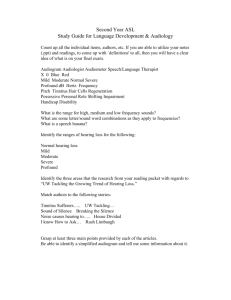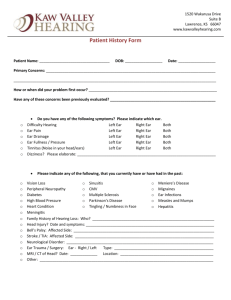What is that terrible ringing in my ears? Tinnitus: Causes
advertisement
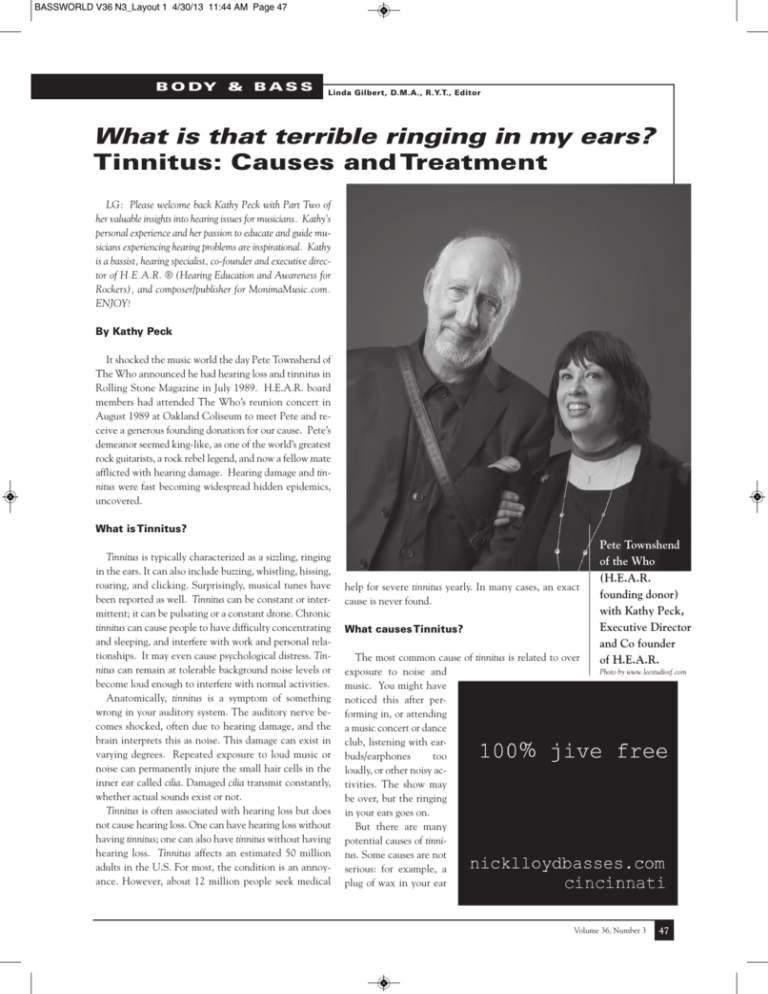
BASSWORLD V36 N3_Layout 1 4/30/13 11:44 AM Page 47 B O DY & B A S S Linda Gilbert, D.M.A., R.Y.T., Editor What is that terrible ringing in my ears? Tinnitus: Causes and Treatment LG: Please welcome back Kathy Peck with Part Two of her valuable insights into hearing issues for musicians. Kathy’s personal experience and her passion to educate and guide musicians experiencing hearing problems are inspirational. Kathy is a bassist, hearing specialist, co-founder and executive director of H.E.A.R. ® (Hearing Education and Awareness for Rockers), and composer/publisher for MonimaMusic.com. ENJOY! By Kathy Peck It shocked the music world the day Pete Townshend of The Who announced he had hearing loss and tinnitus in Rolling Stone Magazine in July 1989. H.E.A.R. board members had attended The Who’s reunion concert in August 1989 at Oakland Coliseum to meet Pete and receive a generous founding donation for our cause. Pete’s demeanor seemed king-like, as one of the world’s greatest rock guitarists, a rock rebel legend, and now a fellow mate afflicted with hearing damage. Hearing damage and tinnitus were fast becoming widespread hidden epidemics, uncovered. What is Tinnitus? Tinnitus is typically characterized as a sizzling, ringing in the ears. It can also include buzzing, whistling, hissing, roaring, and clicking. Surprisingly, musical tunes have been reported as well. Tinnitus can be constant or intermittent; it can be pulsating or a constant drone. Chronic tinnitus can cause people to have difficulty concentrating and sleeping, and interfere with work and personal relationships. It may even cause psychological distress. Tinnitus can remain at tolerable background noise levels or become loud enough to interfere with normal activities. Anatomically, tinnitus is a symptom of something wrong in your auditory system. The auditory nerve becomes shocked, often due to hearing damage, and the brain interprets this as noise. This damage can exist in varying degrees. Repeated exposure to loud music or noise can permanently injure the small hair cells in the inner ear called cilia. Damaged cilia transmit constantly, whether actual sounds exist or not. Tinnitus is often associated with hearing loss but does not cause hearing loss. One can have hearing loss without having tinnitus; one can also have tinnitus without having hearing loss. Tinnitus affects an estimated 50 million adults in the U.S. For most, the condition is an annoyance. However, about 12 million people seek medical help for severe tinnitus yearly. In many cases, an exact cause is never found. What causes Tinnitus? The most common cause of tinnitus is related to over exposure to noise and music. You might have noticed this after performing in, or attending a music concert or dance club, listening with earbuds/earphones too loudly, or other noisy activities. The show may be over, but the ringing in your ears goes on. But there are many potential causes of tinnitus. Some causes are not serious: for example, a plug of wax in your ear Pete Townshend of the Who (H.E.A.R. founding donor) with Kathy Peck, Executive Director and Co founder of H.E.A.R. Photo by www.leestudiosf.com Volume 36, Number 3 47 BASSWORLD V36 N3_Layout 1 4/30/13 11:44 AM Page 48 might cause temporary symptoms. Tinnitus can also be a symptom of more serious middle ear problems such as infection, a hole in the eardrum, or an accumulation of fluid or stiffening (otosclerosis) of the middle ear bones. It can be a symptom of a head and neck aneurysm or acoustic neuroma, either of which can be life threatening and often involve a loss of hearing. In rare cases, tinnitus is caused by a blood vessel disorder. This type is called pulsatile tinnitus. A number of health conditions can cause or worsen tinnitus. Occasionally the sound of tinnitus may be a clicking noise. This may represent a problem with the jaw or Eustachian tube, causing TMJ (temporomandibular joint syndrome). Tinnitus may also be a symptom of a wide variety of conditions: allergy (drug, food or environmental), high or low blood pressure, diabetes, insulin resistance, high cholesterol, hypoglycemia, hypothyroidism, vertigo, and sinus infection. Auditory conditions including hyperacusis (extreme sensitivity to all sounds), recruitment (perception of loud sounds much louder than normal, often accompanied by pain), and presbycusis (natural aging process of the ears) may contribute to tinnitus. Additionally, osteoporosis, sciatic nerve pain, multiple sclerosis, fibromyalgia, anxiety disorders, anemia, and injuries to the head or neck that affect the inner ear have been attributed to symptoms of tinnitus. …Just to name a few causes. Medications A wide range of medications can be toxic to the ears, including prescription and over-the-counter medications, controlled substances, and to a lesser degree certain vitamins and supplements. Medications such as aspirin and ibuprofen can cause tinnitus if overused. If you take aspirin or other drugs and your ears ring, talk with your doc- 48 International Society of Bassists tor. Review all of your medicinal products with your health care provider. Do not stop taking any medications without first talking to your health provider. Generally, higher doses of medications worsen tinnitus; the unwanted noise often disappears when you stop using certain drugs. Stress Research shows that acute stress can literally divert blood flow from the inner ear’s cochlea and deafen you! Adrenaline causes the ear to become sensitive to nervous impulses that would normally not be perceived. If adrenaline levels drop, sensory perceptions will become less acute, and tinnitus symptoms will ease. Treatment and Prevention Treatment When symptoms are intense, do something relaxing, and draw your focus elsewhere. Recognize your head noise as an annoyance and learn to ignore it as much as possible. Distraction is an effective technique to combat tinnitus. Focus on outdoor activities, help others or join some volunteer groups. Take up a hobby. Enjoy music and art. Enrich rather than restrict your life. Become aware of physical and emotional sensations in your body by learning yoga, meditation, tai chi, etc. Become aware of your adrenaline levels and learn to lower them. This will improve your overall health, as well as your tinnitus. Be wary of complaining about tinnitus to others, as it can potentially strengthen its emotional grip and heighten one’s sensitivity to it. Bring in as much inner peace, comfort and physical relaxation as possible into your life. BASSWORLD V36 N3_Layout 1 4/30/13 11:44 AM Page 49 Reduce or eliminate your exposure to high decibel levels to prevent hearing damage, and wear hearing protection. Just by taking a short break (15 minutes) and keeping volumes at lower levels, one can help reduce tinnitus risk. If you have to turn up the volume to hear the bass with your ear-buds/earphones, it could be a sign that something might not be right. Look for ear-buds with truer sound to avoid potential hearing damage. H.E.A.R. worked with the San Francisco Entertainment Commission, the Mayor’s Office and San Francisco Board of Supervisors to pass the Earplug Ordinance for Entertainment Venues in 2002, which requires places of entertainment and after hours premises with a dance floor and a capacity of 500 persons or more to provide or sell at a reasonable cost earplugs to patrons. New York City Mayor Michael Bloomberg announced in early March 2013 that NYC would attempt to raise hearing preservation awareness. Targeting ear-buds and the risks of listening to music too loud on an MP3 player, the campaign will be aimed at teens and young adults. Prevention Prevention is the best cure. If you experience a ringing in your ears that doesn’t subside, have it checked out by a hearing health care professional. When attending places where the music is going to be loud or if working in a place that has noise levels exceeding normal standards, ask them to turn levels down. Get some earplugs: foam, rubber, moldable wax or custom-made earplugs. As discussed in the previous issue’s article, a variety of hearing protection is available. Please refer to this article and www.hearnet.com for more detailed information. The Steve Miller Band and The Grateful Dead coheadlined the first full in-ear, wedge-less national stadium tour using Future Sonics Ear Monitors® and it created a whole revolution: no floor monitors, speakers or equipment on stage: just performers and their musical instruments. Clean stages significantly cut down on overall stage sound levels. (My husband David Denny, formerly of The Steve Miller Band is a hearing loss and tinnitus sufferer, and now strongly advocates for development and use hearing protection for musicians.) Do not overuse your earplugs by wearing them constantly. Ear protection in noisy situations is necessary but constant use of earplugs does not allow the ears to normalize sounds in quieter environments. For people with decreased sound tolerance, it makes them even more sensitive to sound. For people with tinnitus, it further sensitizes the auditory system and makes them more aware of the symptoms. However, when it’s loud be proud you remembered your earplugs. Volume 36, Number 3 49 BASSWORLD V36 N3_Layout 1 4/30/13 11:44 AM Page 50 The Steve Miller Band on stage with ormer member David Denny at Shoreline Amphithether 2012 Photo by Kathy Peck Healthy Life Style Choices and Natural Therapies Chronic tinnitus can be part of a degenerative process characterized by chronic inflammation. Inflammation is the body’s natural response to tissue damage and a process your body uses to heal itself. Eat more natural healthy foods. Follow an anti-inflam- FutureSonics mg6pro Ear Monitors earphones: www.futuresonics.com (for bigger sound at a lower volume) 50 International Society of Bassists matory diet that consists of mainly fresh fruits and leafy green vegetables, non-starchy vegetables, healthy fat sources, lean protein (grass fed/free range meats, cold-water fish like salmon), legumes, nuts and seeds. Drink more water through out the day. Avoid gluten (wheat, rye, barley) soy, sugar, high fructose corn syrup, processed and fast foods, spicy foods and deep fried foods. Mack’s Hear Plugs: Read all labels for arwww.MacksEarplugs.com tificial preservatives like (for high fidelity comfort) MSG, food coloring and salt (high sodium). Nicotine, alcohol (red wine and grain-based spirits), cheese, chocolate, and wintergreen mints can all trigger or increase tinnitus in some people. Stopping caffeine intake (coffee, black and green teas, sodas, energy drinks, chocolate, some medications) for 4 days, drinking more water, and lowering stress levels may significantly reduce symptoms of tinnitus. Certain vitamins and minerals can help reduce tinnitus symptoms. Therapeutic massage, yoga, tai chi, aromatherapy and walking in nature can all help reduce stress and symptoms. Get plenty of rest. Keep a music player near the bed just loud enough to be audible; the static near your head will mask the tinnitus sounds in your head and let you fall asleep. Soft music, nature sounds (such as ocean waves) or white noise can help soothe you to sleep. Become aware of and describe your sensations: What does the noise sound like? Is the sound throbbing or rhythmic? Is it in one or both ears? What other symptoms do you have? Find out the triggers for your tinnitus. Various additional treatment therapies that have proven helpful in coping with tinnitus include: counseling, behavioral modeling, cognitive therapy, hearing aids, TRT- Tinnitus Retraining Therapy (Jastreboff and Hazell model, a sound therapy treatment using masking devices and counseling regimen), acupuncture, naturopathy, homeopathy, chiropractic craniofacial exam, dental TMJ exam, biofeedback, hypnosis, sound therapy (developed by Tomatis), and support groups. BASSWORLD V36 N3_Layout 1 4/30/13 11:44 AM Page 51 Announcing the Sixth Biennial International Society of Bassists Makers’ Competition for Double Basses In conjunction with the 2013 ISB Convention & Exhibitors’ Fair June 2-3, 2013, Eastman School of Music. Over 1,000 convention attendees from 34 countries in 2011. Competition guidelines posted at www.isbworldoffice.com/competitions/luthier.html. International Society of Bassists 14070 Proton Rd., Suite 100 LB 9 Dallas, TX 75244 972/233-9107 ext. 204 • Fax 972/490-4219 info@ISBworldoffice.com Volume 36, Number 3 51 BASSWORLD V36 N3_Layout 1 4/30/13 11:44 AM Page 52 Bass World magazine and its publishers and editors for allowing me to write these two articles for you on hearing preservation. Like Mayor Bloomberg, ISB is helping us to shine a light on the importance of hearing education awareness. Thank you. ~ Kathy H.E.A.R., Hearing Education and Awareness for Rockers, non-profit organization 501 c3 is dedicated to the prevention of hearing loss and tinnitus among musicians and music fans. Please visit www.hearnet.com for an abundance of helpful, in-depth information and more resources, including the following: HEARNET LOGO (Daniel East) www.hearnet.com Professional specialists Resources Tinnitus isn’t normally accompanied by ear pain. If your ears hurt, see an ear specialist immediately. H.E.A.R., Hearing Education and Awareness for Rockers: www.hearnet.com Otolaryngology or ENT (ear, nose, and throat specialist) is the branch of medicine and surgery that specializes in the diagnosis and treatment of disorders of the head and neck. It is one of the oldest medical practices in the United States. Dr Jerome Goldstein, Senior Executive EVP Emeritus of The American Academy of Otolaryngology and H.E.A.R. Board of Directors member tells us that an ENT is the primary physician trained to recognize and treat disorders of the ears, nose, and throat, and should be seen to attempt to identify the cause of chronic conditions. The following medical tests may be done by an ENT/otolaryngologist: head CT scan, head MRI scan, blood vessel studies (angiography), and X-rays of the head. Audiologists diagnose and treat a patient’s hearing and balance problems using advanced technology and procedures. Audiologists can administer an audiometric test and help provide custom ear moulds, masking devices, hearing aids, Tinnitus Retraining –TRT Therapy and other counseling therapies. H.E.A.R. applauds The International Society of Bassists’ Living Strong: www.livingstrong.com The American Academy of Audiology: www.audiology.org The American Academy of Otolaryngology Head and Neck Surgery: www.entnet.org The Mayo Clinic: www.mayoclinic.com The National Institute on Deafness and Other Communication Disorders: www.nidcd.nih.gov The American Speech Language and Hearing Association: www.asha.org The American Tinnitus Association: www.ata.org House Ear Institute: www.hei.org H.E.A.R.’s Listen Smart, a Cine Golden Eagle award winning rockumentary film produced by Dan Beck (H.A.M.F./H.E.A.R. BOD) and directed by Pamela French. http://www.hearnet.com/features/feature_Listen%20Smartindex.shtml Tinnitus Formula: www.tinnitusformula.com Macksearplugs.com Ear Monitors: www.futuresonics.com Melatonin study, Washington University School of Medicine, St. Louis published in the Otolaryngology Head and Neck Surgery: http://oto.sagepub.com 52 International Society of Bassists BASSWORLD V36 N3_Layout 1 4/30/13 11:44 AM Page 53 The family of Scott LaFaro has created a beautiful, full-color commemorative poster taken http://www.hearnet.com/features/articles/ar tist_article_police_ordinance_entertainment_venue.shtml) from an original painting by Scott’s brother-in-law, the painter Manny Fernandez, size: 38” x 24”. All proceeds from sales http://www.prosoundnetwork.com/Default.aspx?tabid=69&EntryId=639; http://www.hearnet.com/images_site/earplu gs/NYCMayorBloombergHearingCampagin.pdf?tabid=69&Entryld=639 benefit the Scott LaFaro Prize, given biennially as part of the ISB Double Bass Competition. Perfect for home or studio. Treat yourself or your favorite jazz fan. Send $40 U.S. plus The Gluten Effect (book) by Dr.Vikki Petersen Ototoxic Drugs Exposed (book) by Neil G. Bauman $10 shipping and handling (international orders add an additional $10 for airmail shipping.) Checks or money orders in U.S. funds, or MasterCard, Visa and American Express accepted. Name __________________________________ Address________________________________________ City, State, Zip/Postal Code ________________________________________________________________ Country ______________ Telephone or email _________________________________________________ Amount enclosed in U.S. funds $_____ __Check __Credit Card (MC/Visa/AmEx______________________________________ Exp__________) Volume 36, Number 3 53
